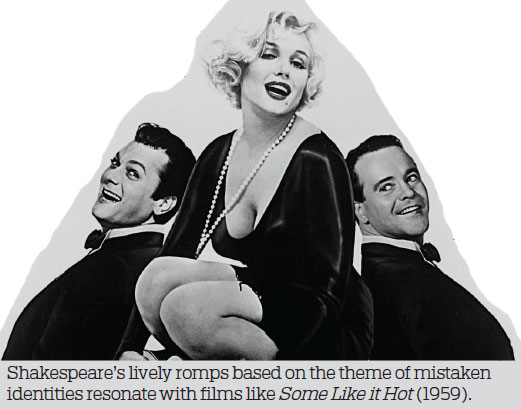Methinks you are my glass
Updated: 2019-10-11 08:15
By Rob Garratt(HK Edition)
|
|||||||
One of the Bard's earliest outings, with a first documented performance in 1594, The Comedy of Errors is a screwball farce built on the flimsy, whimsical conceit that two sets of identical (and identically named) twins were separated at birth - so that when Antipholus of Syracuse and his servant, Dromio, are shipwrecked in Ephesus, that city's native Antipholus naturally confuses his long-lost brother's Dromio with his own, and vice versa. All sorts of silliness ensues.
If it all sounds ridiculous, that's because it is - and London's Globe milk it to the extreme, playfully probing traditional gender expectations in the casting. Here the foolhardy tomboy of Beau Holland, as Dromio of Syracuse, played against the hapless consternation of Eric Sirakian as the Ephesus counterpart to delightful effect - a delicious dynamic which lent the performance its most painful, rather than pained, belly laughs.
But sitting down to Twelfth Night - a notably more developed work penned almost a decade later - reminded any non-scholar how much these two tales have in common. Indeed, it has surely been surmised that grappling with the heavier themes of Hamlet which was penned almost concurrently, Shakespeare sought some easy comic relief by reaching back to an earlier idea.
Again, we have a shipwreck, and a case of mistaken identity - confounded in ridicule once more by the Globe's gender-swapping approach: Off the coast of Illyria, siblings Sebastian and Viola are both washed ashore. Not knowing her brother survived, Viola - played by male Sirakian - chooses to disguise herself as a man, "Cesario," and seek employment with the Duke Orsino (Evelyn Miller, a woman) whom she promptly falls in love with. The situation gets even more complicated when the object of her employer's affections, Countess Olivia (Andrius Gaucas, a man), falls for "Cesario" - and more so when Sebastian - played by female Mogali Masuku - arrives, unscathed, and is mistaken for his cross-dressing sister.
Such contrivances are uniquely suited to the theater - where squinting audiences suspend disbelief and reduce characters to tunic colors - but have undoubtedly left a deep mark on the golden era of cinema. Alfred Hitchcock used the idea of mistaken identity to place ordinary men in extraordinary situations in groundbreaking classics The 39 Steps (1935), The Wrong Man (1956) and North by Northwest (1959).
But all that farce left me thinking especially of Billy Wilder's Jazz Age-set comedy Some Like it Hot (1959), in which Tony Curtis and Jack Lemmon, playing out-of-work musicians, successfully disguise themselves as women in order to join an all-girls band - which only becomes a problem when they encounter the beauty of a certain singer played by Marilyn Monroe.


(HK Edition 10/11/2019 page10)